The clash of metal swords on shields reverberated through the theater. One knight fell, then another; but King Oberto fought on, determined to take back Holland from the Irish invaders. Olimpia, his lady love, had been banished from her homeland, and Oberto would stain the Dutch lands with blood to convince Olimpia of his bravery and win her hand in marriage. In the dark theater I watched the characters intently, fascinated that two-foot high puppets could make movements so precise.
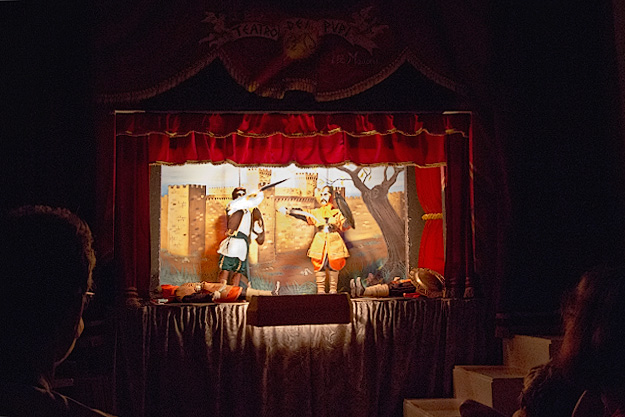
A New Hope for Olimpia is just one of 24 shows that Alfredo Mauceri has written and produced over the years for Teatro dei Pupi. Following the performance I spoke with him about his family’s three-generation love affair with puppets.
“My Mother, Francesca Vaccaro, does all the female voices and my brother, Daniel, builds the puppets,” he explained. “I write the story and am an actor during the show, along with Daniel and one other relative. Together, the three of us move the characters during the show, sometimes one in each hand.”
When I asked why he had decided to follow in the family tradition, he gave an embarrassed laugh before replying.
“It’s simple. Because I love the puppets.”
That love grew out of a strong bond with his grandfather, Alfredo Vaccaro. As a young boy he had accompanied his grandfather when he staged puppet shows in the market square on Ortygia Island, in the Old City of Syracuse, Sicily. Gradually, his grandfather allowed him to work with the characters.
“In three months, I learned only to move the puppets, but it took four, five, six years to get the emotion and sensation of the characters.” By the time his grandfather died in 1995, he knew all about the history of puppetry in Syracuse. He also knew that his destiny lie with the puppets.
The pioneer of the puppet opera in Syracuse was Francesco Puzzo, who made the first puppet in 1875. He debuted his creation in a basement on the island of Ortygia. Francesco ceased performing in 1917, but four years later his sons, led by Ernesto, revived the puppet theater. In 1923, a young pastry chef by the name of Rossario Vaccaro (Saro), opened a shop across the street from the Puzzo brothers. Saro was intrigued by the puppets. Despite the exclusionary tradition of the trade, he managed to gain acceptance and began studying under Ernesto, learning how to construct puppets and armor, paint scenery, write scripts, and produce the necessary advertise materials for shows.
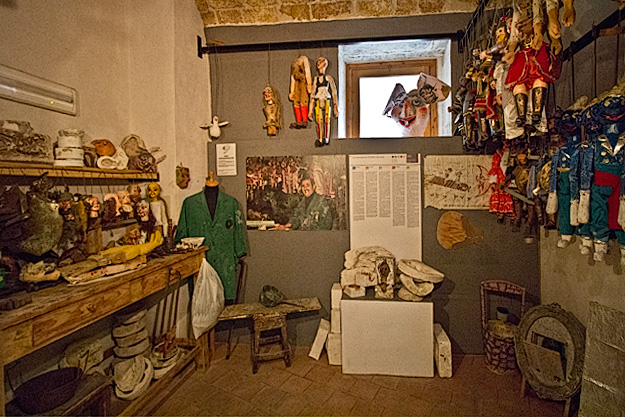
Saro abandoned pastry and began building puppets in a small workshop on Ortigia. Not even the disease that struck him in 1936, which paralyzed the left side of the body, prevented him from pursuing his dream. In the 1970’s, he convinced his brother, Alfredo, a talented papier-mâché craftsman and movie operator, to join the venture. The Vaccaro brothers performed in the streets and squares, wherever they could attract a crowd, intent on reviving interest in the tradition of puppet opera. One day, Alfredo was walking along one of the narrow cobblestone streets in the old Jewish Quarter, carrying a papier-mâché duck puppet. A reporter who was in the Old City to cover another story noticed the puppet. Charmed, he followed Alfredo to the brothers’ workshop and filmed the puppets in action. Television performed the magic that had eluded the brothers; it made them, and their puppets, famous.
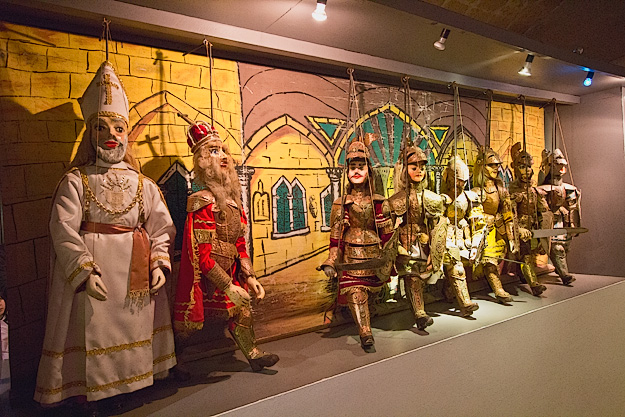
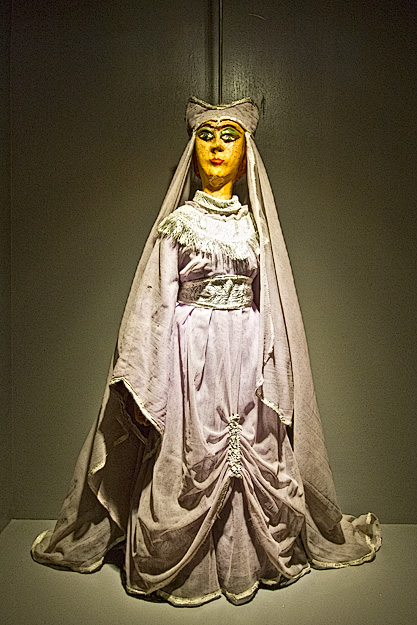
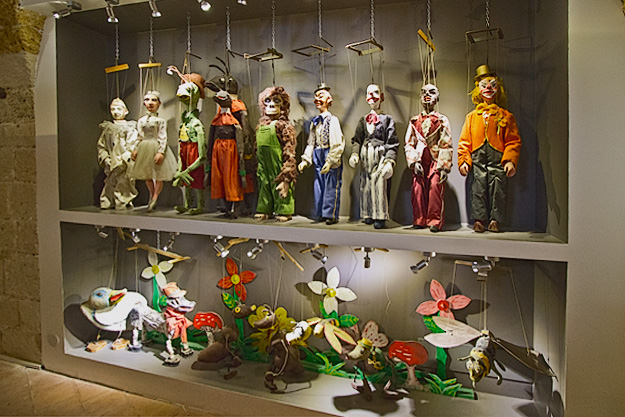
Certain that this historic performance art had potential to attract tourism, both the Provincial Agency of Tourism and the Ortygia Council encouraged the Vaccaros to develop professional performances. Finally, in 1978, thirty years after the closing performance of Ernesto Puzzo, the Vaccaros staged a show at the church of San Giovannello, in the Jewish Quarter of Ortygia. Following its enormous success, the city donated space in an old convent in the historic center for a permanent Opra dei Pupi theater. Saro died in the spring of 1984 but Alfredo carried on until, in 1990, a severe earthquake damaged their theater beyond repair. Once again the puppets were without a home.
Each day, Alfredo visited his beautifully carved and painted pupi, lifeless and gathering dust in the abandoned convent. Lacking the resources to buy or build a new venue, he begged every possible government agency to help, but his pleas went unanswered. Disillusioned and despondent, Alfredo disarmed and undressed each of his puppets, leaving them lying in naked piles on work benches. He dyed the magnificent faces painted by Saro with tempura until their features were unrecognizable.
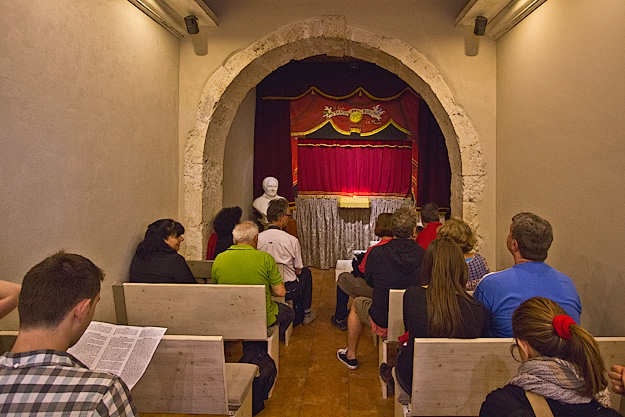
In their place, Alfredo crafted new papier-mâché creatures with rough features and cold glass eyes. Once again he turned to the streets, squares, and schools to perform, now accompanied by his grandson, Alfredo Mauceri. In 1991, with a hardened heart, he refused to accept the Folkloric Artist award from the City of Syracuse, with the harsh words, “I want my dear puppets put in a museum. I do not want them to make the same end as others.” He was referring to Puzzo’s puppets, which had not been preserved. His words underlined the lack of will of the Syracuse administration to preserve the legacy of his craft.
The senior Alfredo got his wish, posthumously. His grandson Alfredo resurrected the puppets and converted a shop in the old Jewish Quarter into Teatro dei Pupi. The Puppet Museum, just down the street from the theater, is home to puppets ranging from hand-sized to nearly life-size, including damsels in long white dresses and cone-shaped hats, knights in full-body armor, and papier-mâché dragons. The museum is also run by the family, as is the workshop where Daniel creates all the puppets. If Grandfather Alfredo is looking down from above, he is surely delighted that his family has restored his cherished puppets to their rightful place in Syracuse society.
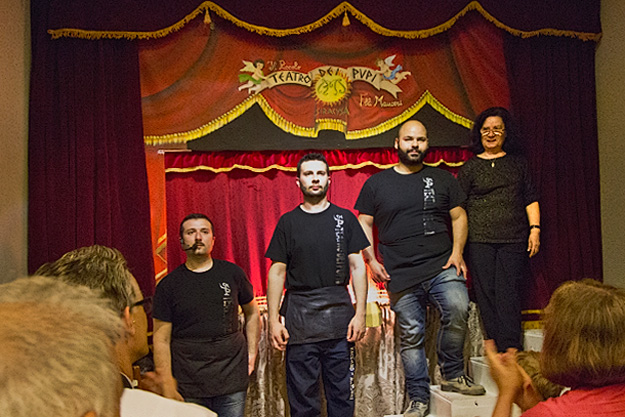
Attending a show at Teatro dei Pupi:
The theater is located on Via Della Giudecca 17/19, in the Old City, located on Ortygia Island. Two shows are performed each day, seven days per week, from March to November. As the theater is quite small, seating no more than 20, reservations are strongly recommended. Call 0931 465540, or stop by between the hours of 10 a.m. to 1 p.m. or 4 p.m. to 8 p.m. Their website, unfortunately, is only in Italian (click here).

Are there puppets to buy in Sicily? I am traveling there in Sept and have always wanted one? Thanks, Rebecca
Hi Rebecca: As I recall, there were puppets available in the local stores, however I’m quite sure they were modern reproductions.
Please—take no offense, but for many years I have collected Phallic Puppets! I have a Turkish one of Karagoz; a Burmese one of a Prince/Nobleman; a Japanese one of a Demon; a Thai one of a Demon; and an Indonesian one, also, of a Demon. I am now checking other countries, cultures: Italy and Czechoslovakia, etc. If you know of another example, please advise. Thanks! Gary
No offense taken. Interesting thing to collect, though.
Thank you for sharing this wonderful expose. If I were to see a puppet show in Sicily, then this is the one I would choose.
You’re so welcome, Christine. I have seen puppet shows all over the world and this one was one of my favorites, so I don’t think you can go wrong.
Your article is an excellent piece of information shared. I am also enthusiastic about traveling here and there and enjoy eating different types of food. This place looks amazing, and I would love to visit once. Thanks for this beautiful article.
You’re welcome, Ryan. So glad you enjoyed it.
Thanks for sharing the wonderful story. I actually did not expect puppet show exist in that part of the world until I read your article! I grew up watching puppet show in Malaysia especially during the Hungry Ghost Festival, a ritual carried out by the Chinese descendants. The show would only be performed nowadays as an entertainment to the spirits and ghosts (if they ever exist..). Hope I will have a chance to travel to Syracuse some days to watch the puppet show. Thanks again ????
You are so welcome, oh! I also loved the puppet show, as you can probably tell from my story. I’ve actually attended puppet shows allover the world and continue to be amazed by how important a part they play in many cultures.
Thank you for sharing this!
I really learned a lot from reading this article, especially about something which was revived and cherished. I am happy that Alfredo got his wish in the end.
It would be so sad to lose something which you poured your heart in, as well as something which reflects an important part of the culture of a people. I fervently hope that this wonderful family continue in this industry so that someday, I’ll be able to witness it, too.
Hi Yzzah: I hope you get to see it someday. It was a very special performance, especially in that I got to speak to the family afterward and see their passion first-hand.